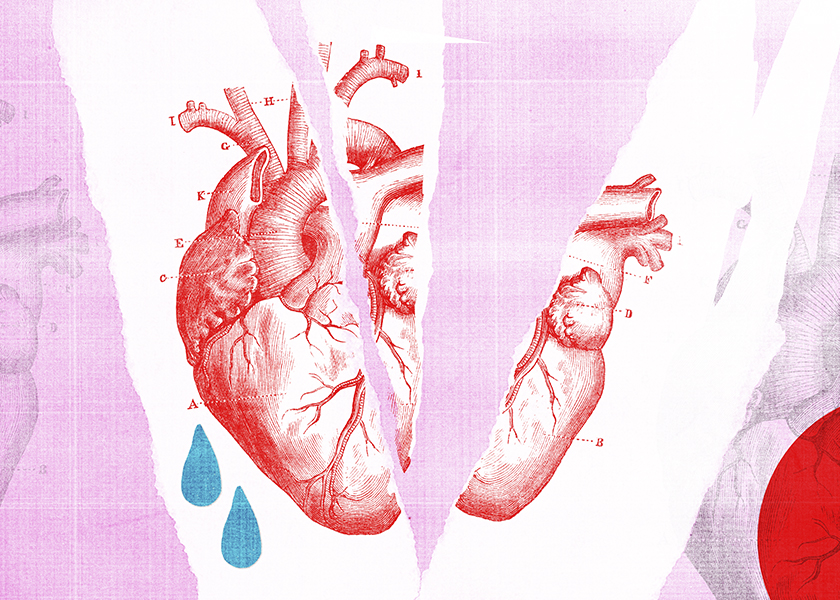- Home |
- Search Results |
- ‘My dear, I don’t give a damn’: The most brutal break ups in literature

My worst break up was over a patchy long-distance phone call from Japan. She was my childhood sweetheart. I had a job in Hiroshima. We were both 19. ‘This long-distance thing isn’t working,’ she crackled across 6,000 miles of phoneline. ‘You crossed the world for six months and now I’ve met someone else. He’s an estate agent.’ I felt like she’d seppuku’ed my heart and given it to her pet poodle as a chew toy. There were no tears (except for a few, from me, in bed, alone), I just said something appropriately teenage about dying alone and then she said goodbye. Credits rolled. I woke up the next morning in a low-budget sequel to my old life, without her in it. Looking back now, I just wish I’d said something cool, something she'd never forget, something like: ‘My dear, I don’t give a damn.’
'Rhett Butler knew how to handle a break up'
Rhett Butler knew how to handle a break up. That’s how he dumps Scarlett O’Hara at the end of Margaret Mitchell’s 1936 Pulitzer-winner Gone With the Wind (the ‘frankly’, by the way, is not in the book, just the film). It’s one of the most famous – probably the most famous, thanks to its 1939 Hollywood adaptation – break ups in literature: a short, cold, cut-your-heart-in-two mic drop. If only I had been better-read back then. If I had, not only might I have said something empowering, maybe I’d have had the tools to better deal with the emotional fallout. I could have turned to literature, rather than pot noodles, for solace.
As every great writer knows, misery is more inspirational than love. Just ask Grahame Greene. ‘The sense of unhappiness is so much easier to convey than that of happiness,’ he wrote in The End of the Affair. ‘In misery we seem aware of our own existence, even though it may be in the form of a monstrous egotism: this pain of mine is individual, this nerve that winces belongs to me and to no other. But happiness annihilates us: we lose our identity.’
‘Well, you see,’ he tells his friend Biffy when asked how he got out of the marriage, ‘old Sir Roderick (Honoria’s father), who’s a loony-doctor and nothing but a loony-doctor, however much you may call him a nerve specialist, discovered that there was a modicum of insanity in my family. Nothing serious. Just one of my uncles. Used to keep rabbits in his bedroom. And the old boy came to lunch here to give me the once-over, and Jeeves arranged matters so that he went away firmly convinced that I was off my onion.'
No, it’s far kinder to do it by letter, as Min does so crushingly to Ed in Daniel Handler’s 2011 YA novel, Why We Broke Up: ‘I’m dumping the whole box back into your life Ed, every item of you and me. I’m dumping this box on your porch, Ed, but it’s you, Ed, who is getting dumped.’
Sometimes relationships crash and burn in a ball of flaming anger. But sometimes they just lose their coordinates, run out of fuel and vanish quietly over the sea. And, surely, never was a break up more depressingly prosaic than the way Laura leaves Rob at the start of Nick Hornby’s 1995 ode to love and loneliness, High Fidelity:
'As every great writer knows, misery is more inspirational than love'
Now... Laura leaves first thing Monday morning with a hold-all and a carrier bag. It's sobering, really, to see how little she is taking with her, this woman who loves her things, her teapots and her books and her prints and the little sculpture she bought in India: I look at the bag and think, Jesus, this is how much she doesn't want to live with me.
We hug at the front door, and she's crying a little.
‘I don't really know what I'm doing’ she says.
‘I can see that,’ I say, which is sort of a joke and sort of not. ‘You don't have to go now. You can stay until whenever.’
‘Thanks. But we've done the hard part now. I might as well, you know . . .’
‘Well, stay for tonight, then.’
But she just grimaces, and reaches for the door handle.
It’s desperately sad, but at least no one dies. In Graham Greene’s The End of the Affair (1951), Sarah inexplicably dumps her lover Maurice after he is nearly killed by a bomb during the Blitz. He is angry, confused and heartbroken by her rejection, and it isn’t until after her death, when he finds her diary, that he discovers the truth as he reads:
So I said [to God], I love him and I will do anything if you make him alive. I said very slowly, I’ll give him up forever, only let him be alive with a chance, …and I said people can love without seeing each other, can’t they, they love You all their lives without seeing you, and then he came in the door and he was alive, and I thought now the agony of being without him starts, and I wished he was safely back dead again under the door.
Maurice’s response? ‘I hate You, God. I hate You as though you existed.’
Greene, like many novelists, saw writing as a form of therapy. It helped him ‘escape the madness, melancholia, the panic and fear which is inherent in a human situation’. For Haruki Murakami, writing is like a ‘time machine … I can remember everything. I can feel the wind. I can smell the air. Very actually. Very vividly.’